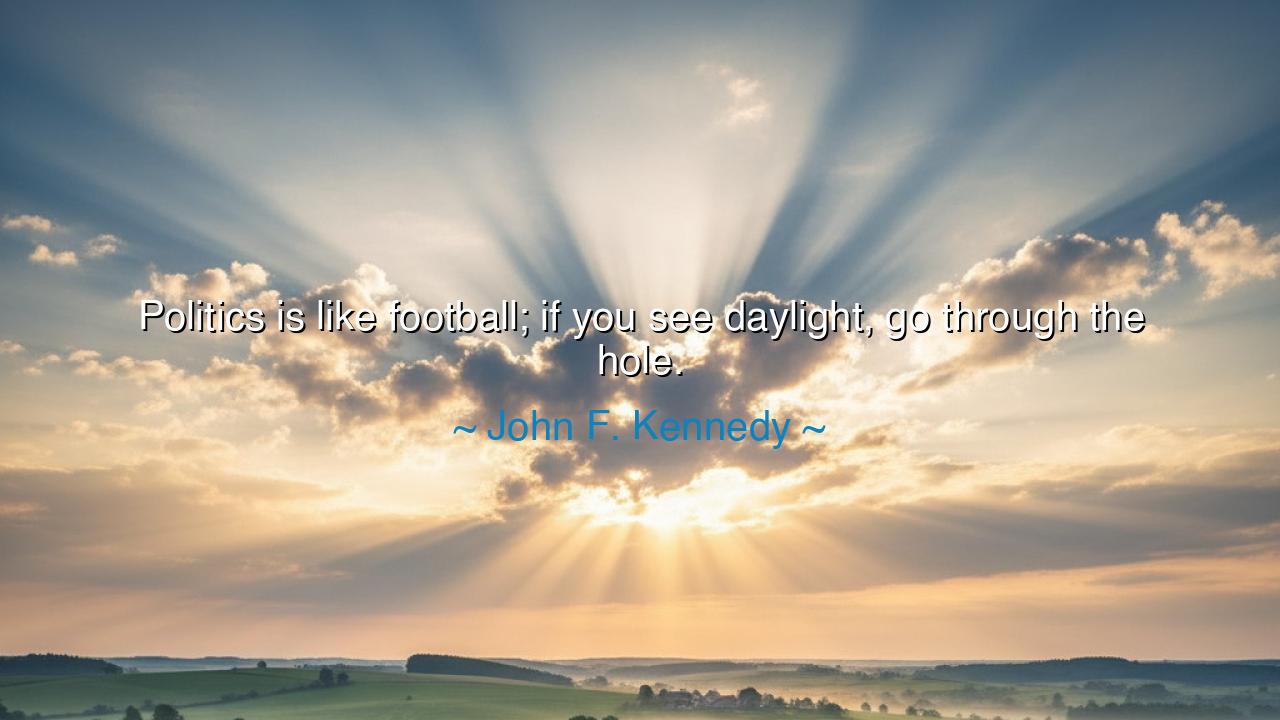
Politics is like football; if you see daylight, go through the






O children of the future, hear the wisdom of John F. Kennedy, who likens politics to the sacred game of football: "If you see daylight, go through the hole." In these words, he speaks of the opportunity that arises in the midst of the struggle for power. In both politics and life, there are moments when the way forward is clear, when an opening—be it in strategy, in public opinion, or in action—becomes visible. The key to success lies in the courage to take that moment, to seize it with all the might and determination of a warrior charging into the breach.
In the ancient world, the greatest generals and statesmen knew that opportunity was the key to victory. Alexander the Great, with his brilliance on the battlefield, saw openings where others saw obstacles. He was not content to wait for perfect conditions, but took every chance to advance, even in the face of overwhelming odds. When he crossed the Hellespont, the very act seemed an impossibility. Yet he saw daylight—an opportunity to strike—and with great daring, he seized it. His success was not just in his strength, but in his ability to recognize and act upon fleeting moments of advantage, much like a football player charging through a gap in the defense.
Kennedy’s metaphor also brings to mind the legend of Cyrus the Great, the founder of the Persian Empire. Cyrus, though born of humble origins, understood that politics, like warfare, required the ability to act swiftly when the hole in the enemy's defenses appeared. His conquest of Babylon, where he entered the city without a fight, is a testament to his strategic brilliance. Cyrus found daylight in the form of a vulnerability, and through that hole, he forged an empire that would endure for centuries. His actions showed the power of recognizing opportunity and moving with swift determination when it is presented.
In Kennedy's time, the Cold War presented a series of openings and challenges for the world. The Cuban Missile Crisis was one such moment where the daylight was clear—there was a gap between diplomacy and military action. Kennedy did not falter; he saw the opening to defuse the crisis with restraint and decisiveness, steering the world away from the brink of nuclear war. His ability to navigate through such a moment proved that politics, like football, is not about blindly charging forward, but about strategy, timing, and knowing when to push through the hole when the opportunity presents itself.
O children, let us remember that in politics, as in life, there will be moments when the path is not clear, when the holes seem small or elusive. But in those rare moments of clarity, when daylight breaks through the chaos, it is not enough to stand idle. One must charge forward, with courage and resolve, knowing that the opening may never come again. Kennedy teaches us that success is not in waiting for perfection, but in recognizing opportunity when it arises and acting swiftly to seize it. Let us walk this path, with the wisdom of the ancients and the courage to move forward when the chance presents itself, for the future is shaped by those who dare to act in the light of fleeting moments of opportunity.






HPHoa Phung
This quote reflects the fast-paced, competitive nature of politics, but what about collaboration and consensus-building? In football, running through the hole is about individual success, but in politics, isn’t the ultimate goal to work together for the common good? Could this perspective of seizing opportunities disregard the need for building alliances and addressing complex issues collectively?
HMHa My
I get what Kennedy is saying, but it makes me wonder: does this mindset lead to ethical concerns? If politics is treated like a football game, where the objective is to capitalize on every opening, are we losing sight of moral values? Shouldn't politics also be about fairness, integrity, and long-term benefits for society, rather than merely exploiting opportunities?
KNBui Kim Ngan
This quote implies that politics rewards those who act quickly when opportunities arise, but doesn't that oversimplify the complexity of political strategy? What happens when one takes advantage of a situation without fully understanding its implications? Can we really achieve lasting progress if we treat political decision-making as a game where the goal is just to go through the hole?
XDTran Hoang Xuan Duyen
Kennedy’s comparison of politics to football is clever, emphasizing the need for opportunism and quick action. But isn’t there a risk in rushing through a situation without considering the long-term consequences? Politics is often about balancing short-term gains with future stability. Could this quote encourage impulsive decisions rather than thoughtful strategies that consider all aspects of the issue?